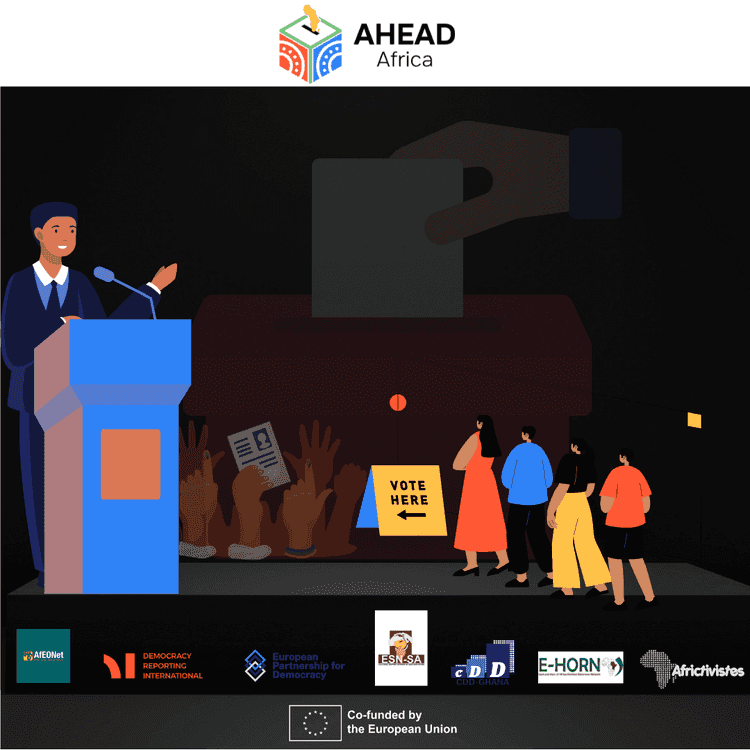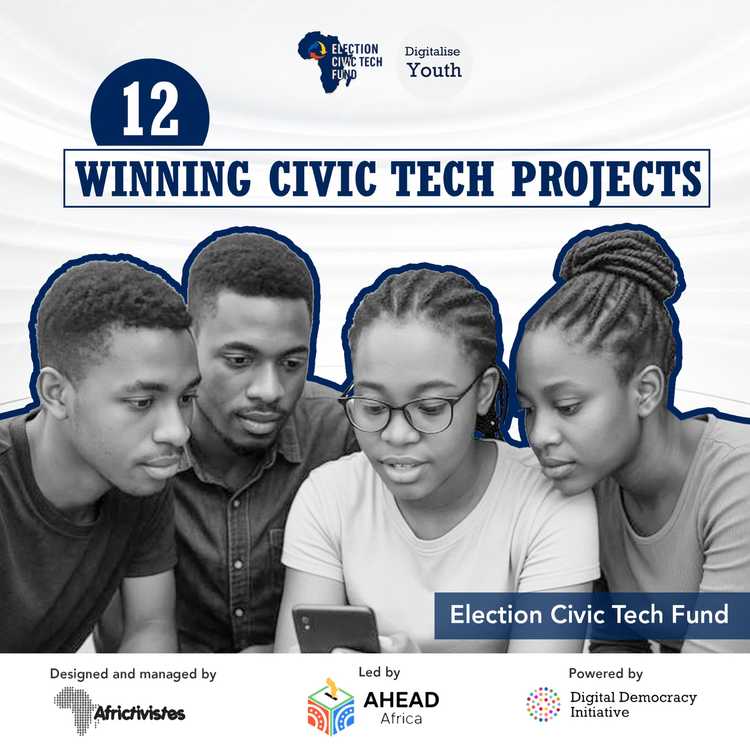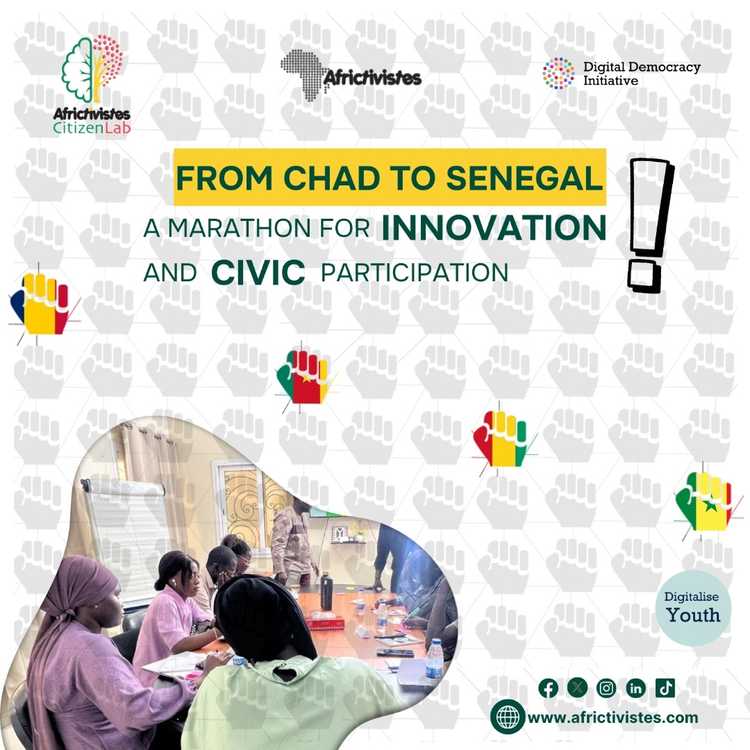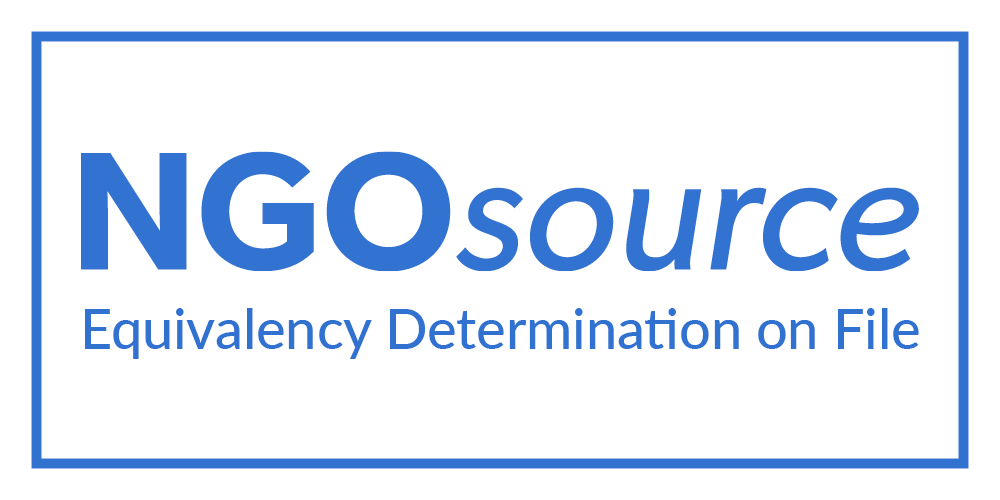AHEAD Africa launch focuses on citizen engagement for electoral transparency and integrity
The AHEAD Africa project was officially launched on Saturday, 20th July in Accra, Ghana, under the theme “Advancing Electoral Integrity through Citizen Engagement !” The launch was held on the sidelines of the commemoration of the 20th anniversary of the Economic, Social and Cultural Council of the African Union (AU-Ecosocc), with the participation of civil society actors from across the continent gathering in the Ghanaian capital.
Frederick Adu-Gyamfi, representing the local host, the Centre for Democratic Development Ghana (CDD-Ghana), opened the ceremony. It featured speeches from the head of the Ecosocc Secretariat, William Carew, and Andrew Songa, regional advisor for engagement with the AU at the European Partnership for Democracy (EPD). The speakers all agreed on the importance of citizen involvement in making elections in Africa inclusive and valuing their recommendations.
According to Mr. Adu-Gyamfi from CDD-Ghana, “Election observation helps to strengthen public trust in electoral processes, thereby preventing violence and promoting a peaceful transition of power.”
For his part, William Carew believes that state institutions and civil society actors must ensure that citizens “are involved at all stages of the electoral processes.” To conclude the ceremony, Andrew Songa reflected on how elections are held one after another without electoral recommendations being implemented.
He stated that “the quality of elections can be significantly improved through the support of citizen observers.” This underscores the relevance of a project like AHEAD Africa, which, with a Holistic Electoral Approach, “leaves no electoral stakeholder behind,” he argued.
The opening keynote, focusing on the upcoming general elections in 2024 in Ghana, was delivered by Sheikh Amiyawo Shaibu, an electoral observer and former president of the Ghana National Election Observation Coalition (Codeo). The former president of Codeo shared recommendations from citizen observers such as: “regulating campaign financing, improving result transmission, and establishing fact-checking platforms…”
Mr. Shaibu, who praised the central role of electoral observers in promoting peaceful elections across the continent, encouraged them to use the Process and Results Verification for Transparency (PRVT) systems, previously known as Parallel Vote Tabulation (PVT). This sophisticated electoral monitoring methodology allows non-partisan citizen organisations to systematically assess the quality of the electoral process up to the announcement of official results.
Following the opening keynote, the second session of the day was dedicated to presenting the activities of two member organisations of the consortium: the West African Electoral Observers Network (WAEON) with Joseph Frimpong, programme officer at CDD-Ghana, and Fatou Kiné Faye, administration and finance officer at AfricTivistes. The pan-African organisation based in Dakar, a consortium member, highlighted digital innovation and civic technology with: an online one-stop shop, a mobile learning programme, a mapping of citizen observation initiatives, a grant mechanism, and a hackathon…
The third session of the day focused on the barriers to youth engagement ahead of the upcoming general elections in Ghana. The observation is that in Ghana, despite a desire to participate in the political process, young people still face numerous challenges. The discussion featured Fabian Kobby, chairperson of the board of the Young Leaders Parliament (YLP) in Ghana, Melissa Hamalambo, executive director of the Centre for African Young Leaders (CYLA) in Zambia, and Abdou Aziz Cissé, advocacy officer at AfricTivistes.
Fabian Kobby, who opened the discussions, addressed the difficulties young people face in breaking into politics. Most of these obstacles are economic. According to him, the financial costs of electoral campaigns not only prevent young candidates from running but also limit their maneuverability if elected, as they become “indebted to their benefactors,” he lamented.
However, the executive director of CYLA tempered this view, stating that independent young candidates can succeed by being “close to their communities.” She cited the example of ten independent MPs elected during the August 2021 legislative elections in Zambia without the support of a political party or entity.
The recent Senegalese elections in March, where young people had a significant impact on the outcome, generated rare enthusiasm, with a turnout rate of nearly 60%. Abdou Aziz Cissé, a pro-democracy activist in Senegal, shared during his intervention some best practices for mobilisation in Senegal, such as: the responsible use of civic technologies, developing common resilience, and combating misinformation and fake news…
Aisha Dabo, programmes’ coordinator at AfricTivistes, thanked everyone who participated in this official launch while offering words of encouragement to all stakeholders present in the room. In closing the ceremony, she recalled the words of Kwame Nkrumah on the “total liberation” of Africa. She emphasised that “to achieve true liberation and democracy across the continent today, the integrity and credibility of our electoral processes are fundamental.”
It should be recalled, AHEAD Africa is a pan-African project co-funded by the European Union, focusing on the multiple facets of the electoral cycle on the continent. It aims to empower African civil society, including citizen observers, to strengthen electoral systems and processes, thereby contributing to the improvement of electoral integrity in the member states of the African Union through capacity building, knowledge production and monitoring, collaboration and networking, and advocacy.
This project is implemented by a consortium of electoral observation and democracy support networks: AfricTivistes, Democracy Reporting International (DRI), the European Partnership for Democracy (EPD), the African Election Observation Network (AfEONET), Electoral support network for Southern Africa (ESN-SA), the East and Horn of Africa Electoral Observers Network (E-HORN), and the West African Electoral Observers Network (WAEON), as well as national networks of civil society organisations on elections.

![[Gabon] AfricTivistes Sound the alarm amid Social Media suspension !](/static/1af016eb97c732e871a7c2fe79a60730/9e635/CREA-visuel-rapide-.jpg)
![[SENEGAL] AfricTivistes strongly condemns the brutal repression of students at Cheikh Anta Diop University in Dakar!](/static/29c233858b9d650cc77d87f75d4d2b56/9e635/Ucad-Senegal.jpg)



![[Guinea-Bissau]: Joint Statement from Human Rights Defenders Against the Confiscation of Popular Will !](/static/8552596543d1c00bc73e662f85c0a62f/fce2a/Capture-decran-2025-12-01-a-16.34.43.png)
![[Guinée-Bissau] Joint Declaration – Afrikajom Center and AfricTivistes both firmly condemn the military takeover and warn of the risk of a political crisis !](/static/4d5ad12346b3ef8c55278621c445488b/9e635/Putsch-Guinee-2.jpg)

![[Tanzanie] 🇹🇿 AfricTivistes strongly condemns violent suppression in Tanzania](/static/adf91a1c13cd101f988b6b6971928880/9e635/TZN.jpg)
![[Cameroon] AfricTivistes condemns violent repression, urges govt to uphold rights !](/static/6399a9d8e94e3ae1f681f86178520d96/9e635/WhatsApp-Image-2025-10-27-at-15.32.48.jpg)



![[Madagascar] Generation Z, the driving force of civic awakening!](/static/9072e289fdab44c062096dcfb9499441/9e635/4-2.jpg)






